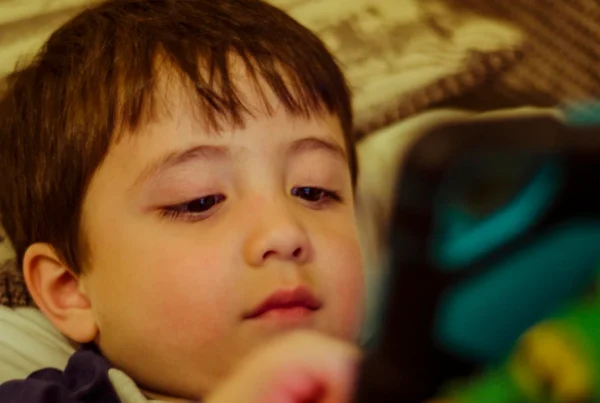Social media platforms represent more than just a digital playground for children; they serve as spaces where young minds can explore, create, and connect in unprecedented ways. Through these social media apps, children can unleash their creativity by sharing artwork, music, or writing, and receive feedback and encouragement from a global audience.
Social media can be a powerful tool for learning, offering access to educational content, tutorials, and discussions that can broaden their horizons and deepen their understanding of various subjects. However, with all good things, there come challenges that require careful consideration.
Additionally, media can be a valuable way to help children express themselves, allowing them to communicate their thoughts and feelings in innovative ways. This is a great opportunity for those who may struggle with traditional forms of communication.
These platforms, while offering immense opportunities for growth and connection, also expose children to risks such as cyberbullying, inappropriate content, and the pressures of maintaining a curated online presence. As parents, understanding these dual aspects of social media is important in guiding children to navigate this digital terrain safely and responsibly. In this article, we’ll explore three effective ways to help parents establish healthy boundaries and foster positive digital habits for their children.
The Good and Bad of Social Media
Social media use has created an opportunity for children to build connections beyond their immediate circles, enabling friendships with those who share similar interests or experiences. This can be a great way for children, especially those who are shy or socially anxious, to develop communication skills in a supportive environment. With social media and its accessibility, children can explore a variety of interests and engage with communities that align with their passions.
However, social media can be a double-edged sword, presenting significant challenges that parents and caregivers must address with vigilance. Cyberbullying remains a prevalent concern; hurtful comments, exclusionary behavior, or even threats can be deeply damaging to a child’s self-esteem and emotional well-being. The ability to connect with others online also comes with the risk of encountering negativity, which might be difficult for children to handle without guidance.
Additionally, exposure to inappropriate content—whether violent, sexual, or otherwise age-inappropriate—underscores the need for close monitoring and setting boundaries on social media apps. Parents should be mindful of how much time their child spends online and encourage healthy digital habits. Taking breaks away from social media when needed can protect children from excessive exposure to distressing or unsuitable content.
The pervasive nature of social media use can also impact mental health and well-being by causing children to spend an excessive amount of time online, leading to feelings of inadequacy or anxiety. The constant scrolling, comparison to curated images, and pressure to gain likes and followers can create validation-seeking behaviors that negatively affect self-esteem. Parents should check in with their children regularly and encourage them to focus on real-life relationships and personal growth.
If there is one key step parents can take, it’s to create a balanced approach to social media use. Encouraging children to engage in offline activities, turn off notifications when needed, and set daily limits on screen time can help them develop healthier habits. This can also reduce digital fatigue and ensure that social media remains a tool for connection rather than a source of stress.
Practical Ways Parents Can Support Their Children in Setting Social Media Boundaries
Parents can take proactive steps to support their children in navigating social media responsibly by following these 3 simple ways:
1. Foster Open Communication
Create a Safe Space for Discussion
Encourage regular, open dialogue with your children about their online experiences. There is a strong need to create a space where children feel comfortable sharing their concerns without fear of judgment. A positive and supportive discussion can be a great way for children to develop awareness of both the benefits and challenges of social media use.
Incorporate Biblical Teachings for Guidance
Incorporate biblical teachings into these discussions to help your children understand the importance of making responsible choices online. One relevant verse to consider is 1 Corinthians 10:23:
“I have the right to do anything,” you say—but not everything is beneficial. “I have the right to do anything”—but not everything is constructive.
This verse reminds children that while they can explore the Internet, not all content and interactions are beneficial. Encouraging discernment in their social media use can be an effective way to promote responsibility.
Tips for Enhancing Communication:
- Ask Open-Ended Questions: Instead of yes-or-no questions, ask your child about their favorite social media activities and the challenges they face.
- Share Personal Experiences: Relate your own experiences with your phone and social media to demonstrate empathy and understanding.
- Regular Check-Ins: Make these conversations a regular part of your routine, showing your ongoing interest in their digital life.
Read also: How to Develop Media Literacy in Children: Essential Tips
2. Implement Effective Monitoring and Supervision
Understand the Importance of Supervision
Monitoring and supervising your child’s online activities regularly is important. Research by Global Studies of Childhood highlights that parents play a crucial role in guiding their children’s internet usage. Social media can be a source of positive engagement, but it can also expose children to dangers like online bullying, exposure to inappropriate content, false information, and more.
Utilize Tools and Set Boundaries
With social media and its constantly evolving nature, it can be challenging to keep up with trends and potential risks. You don’t need to be overwhelmed, as there are tools available to help. Start by understanding the platforms your children use, such as Instagram and TikTok, and how they interact within these spaces.
Establish a Monitoring Routine:
- Review Screen Usage: Establish a routine to review the time your children spend on their devices, particularly before bedtime, to prevent excessive usage.
- Use Monitoring Apps: Use native systems on devices or third-party apps to track screen time and manage their digital footprint effectively.
- Set Specific Goals:
- Encourage your children to have personal goals for their tech usage, such as spending more time on educational apps rather than on your social media.
Encourage Biblical Wisdom in Online Interactions
From a biblical standpoint, it’s important to encourage wisdom and discernment when using social media because, in a world where trends and digital influences are constantly evolving, you must guide your children not to be controlled by these changes but to manage them wisely.
For example, we can use Romans 12:2 as a guide: “And do not be conformed to this world, but be transformed by the renewing of your mind, that you may prove what is that good and acceptable and perfect will of God.”
3. Educate About Digital Literacy and Responsible Use
Promote Digital Literacy
Digital literacy is an essential skill that helps children navigate the online world safely and responsibly. It involves critical thinking, cybersecurity awareness, and understanding online etiquette. Educating children about safe social media use and its impact on their lives can help them develop responsible habits.
Parents can help by teaching children how to verify information before believing or sharing it. Encouraging discussions about cybersecurity and privacy settings, as well as avoiding online scams, can also contribute to safer digital experiences.
Empower Informed Decision-Making
Encourage children to focus on meaningful interactions rather than seeking external validation through likes and followers. If they ever feel pressured by social media, remind them that it’s okay to take a step away from it.
Partner with Educational Institutions
In addition to home education, partnering with a school that prioritizes digital literacy within its curriculum can provide a strong support system for your children. Here at Sekolah Pelita Harapan (SPH), we address digital literacy comprehensively, integrating it into our educational programs to ensure students are well-equipped to handle the complexities of the digital world. Collaborating with institutions like ours can enhance your efforts at home, providing a consistent and reinforced approach to teaching responsible and safe technology use.
Steps to Enhance Digital Literacy
- Encourage Critical Thinking: Teach children to question the credibility of online sources and the intentions behind the content they consume.
- Discuss Online Etiquette: Discuss the importance of respectful communication, highlighting the impact of their words and actions on social media.
- Engage in Interactive Learning: Use digital literacy games and activities to make learning about online safety and responsible use engaging and interactive.
If you need to learn more about teaching digital literacy to children, you can check out this article!
Read also: Boost Your Child’s Literacy Skillsets: 7 Steps on How to Teach, How to Read
What the Bible Says About Social Media Boundaries
From a biblical perspective, parents are called to stewardship over their children’s lives, including their digital interactions. Social media can be a useful tool, but it can also present challenges that require guidance and wisdom.
Proverbs 4:23 advises, “Above all else, guard your heart, for everything you do flows from it.” This wisdom applies directly to guiding children in their use of social media apps, encouraging them to have discernment and guard their hearts and minds against negative influences.
Ephesians 5:15-16 also encourages wise living, reminding parents and children alike to stay mindful of how they use their social media usage, time, and technology: “Be very careful, then, how you live—not as unwise but as wise, making the most of every opportunity.”
As a parent, it’s essential to reflect on how much time your child spends on their phone or devices is essential. Setting boundaries around the time spent on social media apps and encouraging children to take a break from social media helps foster a healthier balance between online engagement and real-life interactions with friends and family.
Balancing Social Media and Mental Well-being
While social media and its accessibility offer numerous benefits, excessive use can take a toll on mental health. The pressure to maintain an online presence can be overwhelming, leading to stress, anxiety, and self-esteem issues.
To create a balance, parents should encourage children to turn off notifications when needed, set time limits on social media apps, and prioritize real-life interactions. Your child’s well-being should always come before screen time. Engaging in hobbies, spending quality time with friends and family, and participating in outdoor activities can help children develop a sense of fulfillment beyond the digital world.
We all want our children to use social media wisely. It is not about avoiding it altogether but rather learning to use it intentionally and responsibly. By guiding children in their social media journey, you can help them build a positive and healthy relationship with technology.
Conclusion
In conclusion, while media can be a tool for connectivity and education, it is important to acknowledge its potential risks. By setting boundaries, fostering open communication, and promoting digital literacy, parents can help their children navigate the digital world safely and responsibly.
Additionally, choosing a school that prioritizes children’s safety in the digital world is essential in their journey. Sekolah Pelita Harapan (SPH) is dedicated to integrating digital literacy education into our curriculum. Our approach emphasizes not only academic excellence but also the ethical and safe use of technology.
The Primary School Jakarta program is one example of an initiative designed to lay the foundations for the responsible use of technology from a young age, ensuring that children develop a balanced and healthy relationship with digital devices. Apart from that, the SPH Learning Pathway also provides a structured and comprehensive educational journey that supports student growth from early childhood to adolescence.
At SPH, you can also find resources and support that help parents and students navigate the complexities of social media usage responsibly.
If you’re looking for a school that values digital literacy, student well-being, and holistic development, SPH is a great choice. We are committed to preparing students for a digitally connected world while ensuring they maintain strong moral values and a balanced life.
Contact us today and discover how SPH can support your child’s growth—both academically and emotionally—while helping them develop a responsible and healthy relationship with social media.











